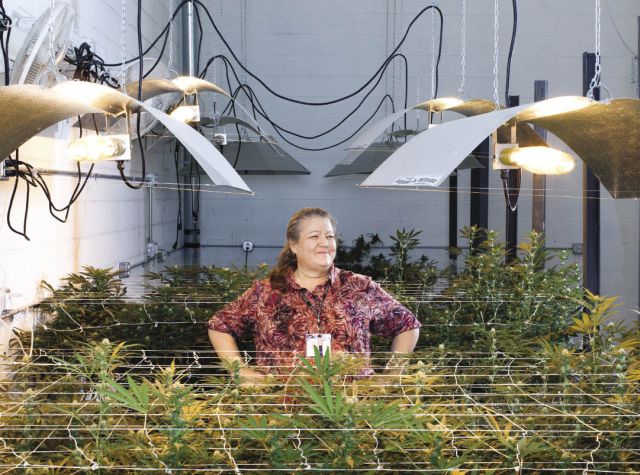The outside of BotanaCare is unassuming, almost forgettable; the large building sits in an industrial park by the highway in Northglenn, Colorado. But things get more interesting when you approach the front doors. It has two, actually, marked “Recreational” and “Medical.” Walking into the recreational lobby, which sits next door to the medical suite, the smell of marijuana, thick and nearly overpowering, hits you, hard. There, several customers are sitting anxiously, eager to get their product. They’re mostly men under the age of 30, some in steel-toed work boots, but there’s also an older gentleman in a tie and dress shirt. Behind the counter, half a dozen young employees serve customers and roll joints next to shelves packed with countless different strains of weed, ganja edibles, pot tinctures, and smoking literature. This weed is prime-rib compared to the hamburger one finds in other parts of the country, and while most of BotanaCare’s customers are men, it’s owned by two women: sisters Robin and Cheri Hackett. It’s also one of the most successful dispensaries in Colorado, serving both the recreational crowd searching for a legal high, and the crowd looking for a non-traditional cure for whatever ails them. Welcome to the Amsterdam of the Rocky Mountains, headquartered in the most controversial and profitable state in the Union. Colorado is now a part of the marijuana revolution, and the Hackett sisters are just two of the female “ganja-preneurs” who are putting the “blaze” in “trailblazer.”
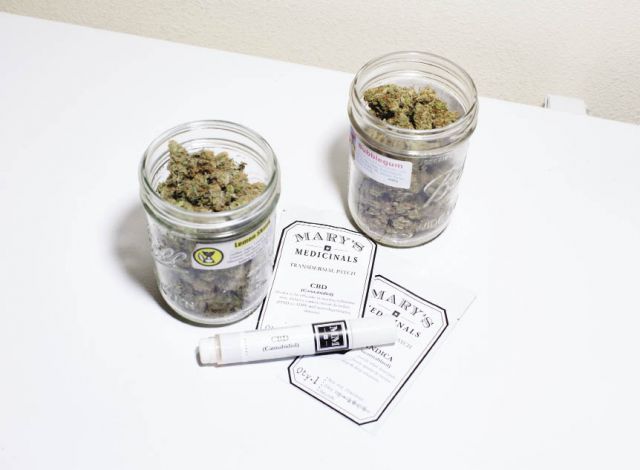 Some of BotanaCare’s offerings.
Some of BotanaCare’s offerings.
Medical marijuana was legalized in Colorado in 2000, but since January 1, 2014, it’s been legal for anyone 21 and older in Colorado to use pot, or possess up to an ounce of it for any reason—even if it’s just, as Rolling Stone magazine put it, “for getting-high purposes.” The state of Colorado estimates that its citizens now purchase 130.3 metric tons (287,259 pounds) of pot annually; the state’s weed-related tax revenue is expected to total $40 million by the end of the year. And thanks to changing attitudes about the plant, careers in weed are attracting Colorado citizens by the thousands—as of May 1 of this year, 9,641 people have been licensed by the state to work in the marijuana industry, a number that’s almost equal to the number of law-enforcement officers in Colorado. Unsurprisingly, this bright new frontier is full of enterprising ladies: according to estimates, a third of Colorado’s industry is made up of women. They’re taking advantage of the cash cow that legal weed represents, and making the rest of the world pay attention to the big square state.
“You fill out an application through the state of Colorado, and it’s super lengthy—like 20 pages. You have to get fingerprinted. You can’t have any felonies on your record, no drug-related misdemeanors. You can’t have any outstanding debt to the state, like child support or tax debt. You literally have to write down and describe any tattoos.”
Per Colorado law, BotanaCare grows its pot in-house, and their operation looks way more like a high-tech lab than a Cheech and Chong set; it feels like you should be wearing a white lab coat and those sanitary shoe booties inside. There are two huge warehouse rooms filled with endless rows of plants, and huge light fixtures chained to the ceiling. No two specimens look alike; there are short plants with thick, fat leaves, and tall plants with thin leaves. Some look too big to be real. Hackett can explain the subtle differences between the indica plants, the sativa plants, and the various hybrids, and the strains have names that sound like Pink Floyd song titles: Skywalker Alien, Golden Goat, Lemon Skunk, and El Diablo. It’s not an easy task to successfully grow pot, so the conditions have been tweaked to ensure plenty of foliage; the light in one room is warm, simulating the daytime sun, to trigger certain attributes in the plant, while the other room is cool and dark. The carefully designed exhaust system hums at a steady roar, rendering conversation difficult. If you look closely, you can see that these plants have been trimmed and watered to exacting specifications. And each wears a sort of barcode bracelet that allows the state of Colorado to track its every move.
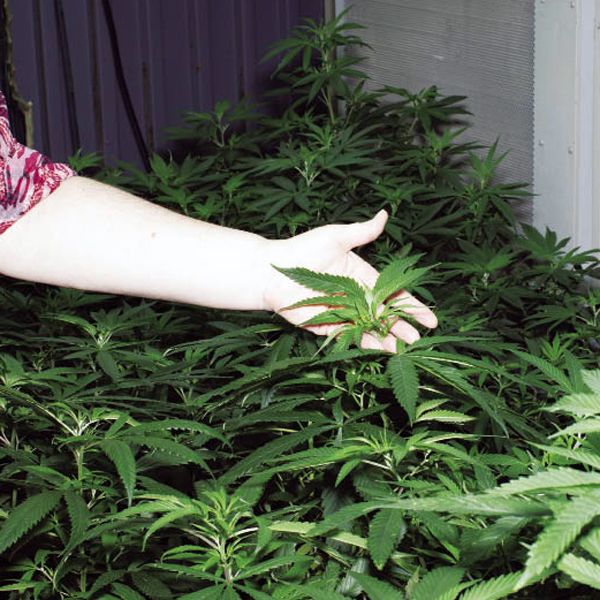
Hackett inspects the goods.
Robin Hackett, BotanaCare’s co-owner, might be the most radical woman in the Centennial State: she’s equal parts Rosie the Riveter (she was the first female journeyman steelworker in Colorado), activist, and caretaker. Due to an on-the-job accident, Hackett suffered a spinal injury, and turned to medical cannabis to help deal with the debilitating pain. With that introduction to the field, Hackett and her sister joined forces in 2010 to launch BotanaCare’s medical-marijuana facility. Since then, she has studied the effects of the drug on more than 800 patients who were suffering from various maladies. (Marijuana has been used to cure or ease the symptoms of diseases ranging from psoriasis, acne, and nausea, to more aggressive issues like staph infections, post-traumatic stress disorder, osteoporosis, lupus, and Crohn’s disease.) She also tracks feedback on strains and products from 2,000 more customers. In fact, Hackett’s data set is so impressive that scientists often approach her with questions concerning methodology, dosing, and the consequences of treatment over time. BotanaCare opened its doors to the recreational crowd on New Year’s Day 2014, the first day it was legal in Colorado; 100 customers were waiting in line when the shop opened that morning. These days, according to BotanaCare’s carefully tracked statistics, for every medical patient they receive, about five more walk through the door marked “Recreational.” But Hackett’s most proud of the fact that her products have helped her medical-marijuana customers cope with pain and chronic disease. “It gives them the will to live,” she says. “That’s as important in their health as the [medical] treatment they’re trying to endure.”
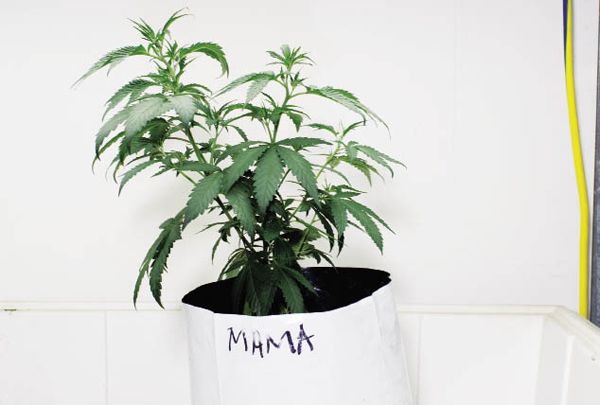
Eryn Jones, a bud-tender [the pot world’s variation on “bartender”] and assistant manager of a large dispensary located in downtown Denver, also got started in the industry because she was using weed medicinally. “I was a medical marijuana patient back in 2009,” she says. “I got my card for menstrual cramps.” Later, when she was looking for a job in a pot shop, she had to go through a crazy-extensive application process in order to get her “med badge,” the credential one needs to start working at any shop that hawks marijuana, whether for recreational or medical purposes. “You fill out an application through the state of Colorado, and it’s super lengthy—like 20 pages. You have to get fingerprinted. You can’t have any felonies on your record, no drug-related misdemeanors. You can’t have any outstanding debt to the state, like child support or tax debt. You literally have to write down and describe any tattoos.” Once they finally get hired, bud-tenders are paid $10 an hour, but that’s supplemented by tips, just like a waitress’ salary. And although most employees do partake in their product, being “medicated” on the job is a major faux pas and is even grounds for dismissal.
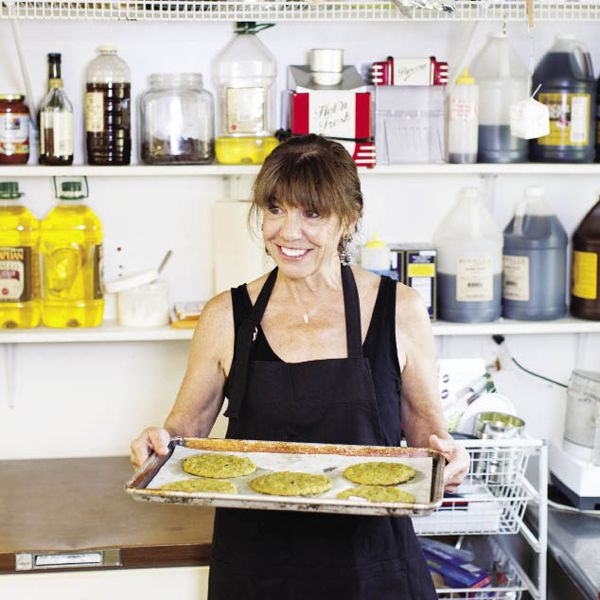
Karin Lazarus, cooking up something delicious
But not all female ganja-preneurs come to the biz via their doctor’s office; some get there because they simply enjoy the drug. One such member of this weed revolution is Karin Lazarus, founder of Boulder’s hugely successful Sweet Mary Jane Edibles. She has been crowned “The Queen of Munchies” by New York magazine, has won multiple awards for her confections, and has a cookbook coming out from Random House. Lazarus got started in the industry when she combined her killer baking skills (she was previously a test baker for Delicious Living magazine) with her love for cannabis, and began making the most amazing pot brownies. “I just started baking and bringing it to dispensaries I knew would try it. One person told another, and it was slow in the beginning, but we’re slammed now.” Today, Lazarus’ line includes pot bars, pot cookies, and even pot caramel corn, and her business has more than quadrupled since she opened in 2010. She creates her goodies—which she sells to about 100 medical dispensaries across the state—in an industrial kitchen outside Boulder, and has eight full-time employees. She’s applying to sell her edibles to recreational shops right now, after which point her business will likely skyrocket.
“I didn’t want to be feeding into that stereotype of ‘stoner culture’ and the ‘dirty hippie.’ It’s so much more than that”
In case it isn’t clear already, the pot industry isn’t run entirely by burnouts and criminals, though that’s a common misconception. Katie Shapiro, the style and fashion writer for The Cannabist (a website launched by the Denver Post to keep up with marijuana-related news), got involved in the movement just to dispel those kinds of myths. Professional and ambitious, the only thing that identifies her as a smoker is the tiny pair of designer diamond-encrusted gold pot-leaf earrings she’s wearing. “I didn’t want to be feeding into that stereotype of ‘stoner culture’ and the ‘dirty hippie.’ It’s so much more than that,” says Shapiro. “There are a lot of things happening in high fashion and in pop culture, with people coming out as proud pot smokers. But some professional women aren’t comfortable with that.” Similarly, the creators of FourMaryJanes.com started their website (which is based in Seattle but avidly follows the Colorado scene) in an attempt to change people’s perceptions about female stoners. “We were excited about legalization, and curious about what was going on in the space, but we were very surprised to see just how ‘dude’-focused so much of the industry is,” says one founder. “There is very little out there from a content standpoint focused on women. We know plenty of women professionals, who are parents and responsible adults, who still enjoy cannabis.”
“When I get paid every two weeks, I have to walk around with more than a grand in cash in my purse before I make it to the bank”
Although running a dispensary might seem dangerous, crime has actually decreased in Colorado since legalization. Since Amendment 64 passed, the state has seen reductions in burglaries, robberies, violent crimes, and property crimes. But legalization has still added some danger to the dispensary employees’ lives. Legal weed is primarily a cash business, and weed-based companies can’t deposit their profits in a traditional FDIC insured bank—since marijuana transactions are still illegal at the Federal level, doing so would result in a racketeering charge. So female bud-tenders and shop managers are forced to walk around with large amounts of cash at the end of the day, upwards of $30,000 at a time. “When I get paid every two weeks, I have to walk around with more than a grand in cash in my purse before I make it to the bank,” says Jones. “And when I’m the only manager on duty, I’m alone at night counting $10,000 in cash. The government’s just like, ‘Yeah, we’re working on that banking issue, we’re working on that banking problem.’ I’m like, ‘Yeah, you need to work on that goddamn banking problem.’”
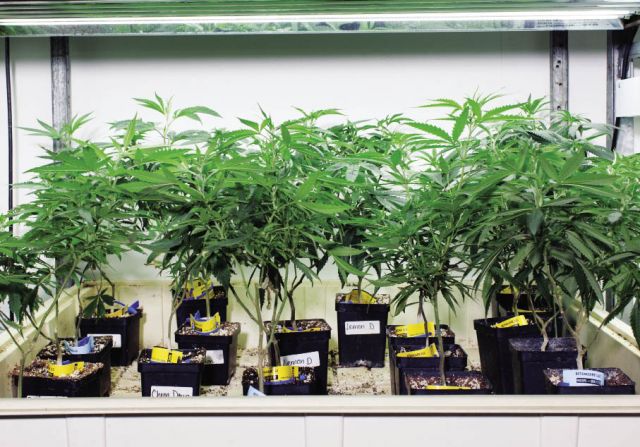
Thriving plants at BotanaCare
Since the weed industry is predominantly male, women in the biz say they’re often victims of sexism. “Craigslist job postings will say they’re only looking to hire women,” says bud-tender Leanne Parker, who has “boss lady” tattooed on her foot. “I get the impression that lots of places expect the bud-tender to be a good-looking girl. That offends me so much. There were jokes about making us tight little T-shirts to wear. I was like, ‘No! I’m going to wear what I want and look put together and professional.’ I’m not going to be an object.” Tellingly, according to The Cannabist, a common variation on bud-tender is “boob-tender,” a derogatory term defined as “an attractive female who was hired solely to cater to the highly-competitive 18-to-35 male demographic with her looks, rather than her deep knowledge of the product.”
Parker says customers’ assumptions about female bud-tenders have definitely affected her work. “Something that drove me absolutely crazy at the last place I worked was when customers walked in and saw me and a male coworker; even if [the male coworker] wasn’t working behind the counter, they’d immediately go to him, and ask him questions. Or we’d get calls and a woman would pick up, and the caller would say, “Can I speak to your manager?” just because they heard a chick answer the phone. Little things like that eventually added up. There’d be times where I’d just sit in the corner and be like, ‘I need a moment.’”
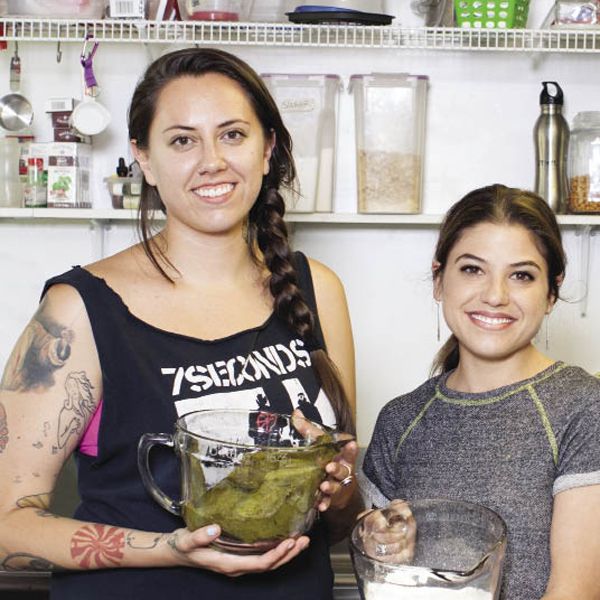 Bakers from Sweet Mary Jane Edibles
Bakers from Sweet Mary Jane Edibles
The New York Times recently endorsed the legalization of marijuana at the Federal level—a powerful sign that the national tide is turning in favor of the plant. While Colorado’s female ganja-preneurs are hopeful about the future of the movement, they’re aware that, for the moment, they’re stepping into uncharted waters. “Colorado is kind of like the sacrificial lamb for the movement, no matter how you look at it,” says Parker. “There was already an entrepreneurial spirit here,” says Shapiro, “and now there’s a huge opportunity for new and creative businesses that use marijuana, like spas offering crazy pot-based treatments and AirTHC [a Colorado-based spinoff of Airbnb that lets weed-friendly property owners list their places].” Lazarus agrees that it’s hard to figure out what the future holds, but she’s ready for anything. “People refer to the folks in the industry as pioneers, because we’re all trying to figure out the ropes,” she says. “There’s no way to look up what we need to do—there’s no historical precedent. But we’re doing it.”
By Kelly Maxwell. Photos by Morgan Rachel Levy.
This story originally appeared in BUST Magazine. Subscribe today!

